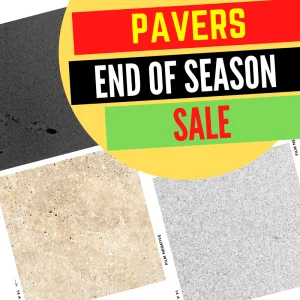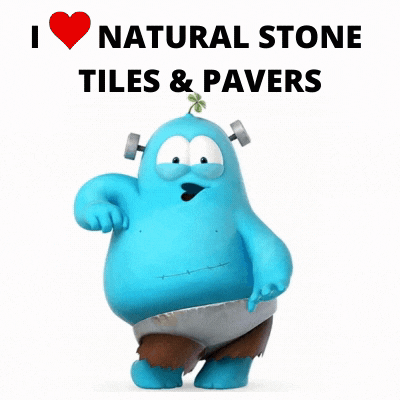
👑 DON’T MISS OUT ON OUR 2024 EOFY SALE…. UNBELIEVABLE “ROCK” BOTTOM PRICES👑
Call: 03 9706 9767
Mon-Fri 7:30am - 5pm / Sat 9am - 4pm
👑 DON’T MISS OUT ON OUR 2024 EOFY SALE…. UNBELIEVABLE “ROCK” BOTTOM PRICES👑
Mon-Fri 7:30am - 5pm / Sat 9am - 4pm
Before we dive into the pros and cons of travertine stone, let’s first understand what travertine is.
Travertine is a type of natural stone that can be found in various countries like Italy, Iran, Turkey, Mexico, and Peru. It forms from minerals that settle at the bottom of water beds, similar to how limestone is created. In fact, travertine is often considered an early stage of limestone. The stone is made up of compressed shells and debris from aquatic organisms, giving it a dense fibrous texture and organic appearance.

In Australia, it is a popular choice for homeowners looking to enhance the aesthetic appeal of their indoor and outdoor floorings. Whether you’re considering travertine tiles or pavers for your next home renovation project, it’s essential to understand the pros and cons before making a decision. In this article, we will cover the advantages and disadvantages of travetine tiles and pavers, to help you make an intelligent choice for your indoor and outdoor paving.
Travertine tiles are typically used for indoor applications such as bathroom flooring, backsplashes, and showers. They are cut into standardised square or rectangular shapes and come in various sizes, ranging from small mosaic tiles to larger formats. These days, In Australia, french pattern travertine tiles are trendy and come in multiple shapes, sizes and covers. Travertine tiles are thinner compared to pavers, usually 12mm thick. They are also a great cost-effective solution for laying over a concrete slab around swimming pool paving. Check our wide range of travertine tiles here.
Travertine pavers, on the other hand, are specifically designed for outdoor use. They are thicker and more robust than tiles, typically 30mm in thickness. Pavers are used for applications like patios, pool decks, steppers, and driveways, usually where you don’t want to have the added expense of laying a concrete slab as they can be laid onto a sand bed. Due to their thickness and durability, they can withstand the heavy weight of vehicles and are resistant to the wear and tear of outdoor elements.
Travertine is renowned for its timeless beauty and elegance. Its natural variation in colours and surface patterns adds a touch of uniqueness to any space. Whether you choose tiles or pavers, travertine offers a classic and sophisticated look that can complement various architectural styles.
Travertine tiles and pavers are highly durable and can withstand heavy foot traffic and weather exposure. With proper installation and maintenance, they can last for decades without losing their charm. This durability makes them an excellent long-term investment for your home. It is this durability that makes travertine tiles a standout tile for use on bathroom floors or outdoors around a swimming pool.
Travertine has excellent heat resistance properties, making it a suitable choice for areas with high temperatures. Whether you’re using it around a pool area or for outdoor pathways, travertine remains cool to the touch even under the scorching sun, providing a comfortable surface for walking.
Travertine offers versatility in design options, allowing you to create various patterns and layouts. With a wide range of sizes, shapes, and finishes available, you can customise your tiles or pavers to achieve the desired look for your space. Whether you prefer a traditional or contemporary style, travertine can adapt to your design preferences.
Travertine is a natural stone formed by mineral deposits in hot springs. As a result, it is an environmentally friendly choice for your home. By opting for travertine tiles or pavers, you are selecting a sustainable and eco-conscious material that minimizes the impact on the environment.
Honed and Tumbled travertine is known for its excellent slip resistance. The textured surface, created through the tumbling process, enhances grip and traction, making it particularly suitable for outdoor areas or spaces where slipperiness is a concern, such as pool decks, patios, and walkways. The natural indentations and grooves on the surface provide additional grip, reducing the risk of slips and fall.
Investing in travertine tiles or pavers can significantly increase the value of your property. Their luxurious appearance and durability make them highly desirable among homebuyers. Installing travertine can make your home stand out in the real estate market and attract potential buyers.
Travertine is available in a variety of popular colours such as silver travertine, ivory travertine, white travertine and more. Whether used as outdoor flooring, swimming pool paving, wall cladding or as a centrepiece in architectural marvels, travertine exudes a timeless elegance that transcends trends. Its pristine neutral colour canvas serves as a backdrop for your outdoor paving, effortlessly enhancing both modern and classical spaces. It is a statement of refined luxury, a symbol of purity and sophistication.
One of the primary concerns with travertine is its porosity. Travertine floor tiles and pavers are susceptible to stains from spills and oils if not properly sealed. It is crucial to apply a high-quality sealant regularly to prevent liquids from penetrating the stone and causing permanent stains.
Travertine floor tiles require regular maintenance to preserve its beauty and durability. Apart from sealing, it is essential to clean travertine tiles and pavers with non-abrasive and pH-neutral cleaners. Additionally, any acidic substances, such as vinegar or lemon juice, should be avoided as they can etch the stone’s surface.
While travertine is durable, it is softer compared to some other natural stones. This means it can be more prone to scratches and scuffs if it has a polished surface, especially in high-traffic areas. Placing protective pads under furniture legs and using rugs or mats can help minimize the risk of scratches. For this reason, we recommend a honed and tumbled finish outdoors especially.
Polished travertine floor tiles in a bathroom can become slippery when wet, posing a potential safety hazard. This is particularly important to note if you plan to use travertine around a pool area or in wet environments, you must use a honed and tumbled outdoor tile NEVER polished travatine. Adding a non-slip sealant or using textured finishes can help improve traction and reduce the risk of slipping on your travertine flooring.
Travertine is a premium material, and travertine prices can be higher compared to other flooring or paving options. Also where you buy travertine tiles will often affect the travertine tile price. Additionally, the installation process may require professional expertise, adding to the overall expenses. It’s crucial to consider your budget and weigh the long-term benefits against the initial investment.
In conclusion, travertine tiles and pavers offer a wealth of benefits, from their stunning visual aesthetic to their long-lasting durability. While considering the pros and cons, it becomes conspicuous that travertine is a remarkable choice for outdoor paving and other home renovation projects.
If you’re looking to enhance your outdoor swimming pool, driveways, patio or other outdoor spaces with the timeless beauty of travertine, contact stone pavers Australia today! We deliver travertine tiles in Melbourne, Sydney, Brisbane and across Australia. Call us now on (03) 9706 9767.
Check travertine tiles prices here.

CALL US TODAY! Order Your FREE SAMPLE – Express Posted
Travertine Tiles | Bluestone Pavers | Limestone Pavers | Pool Coping | Pool Pavers | Crazy Paving | Stackstone Tiles | Contact Us




